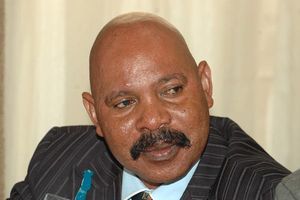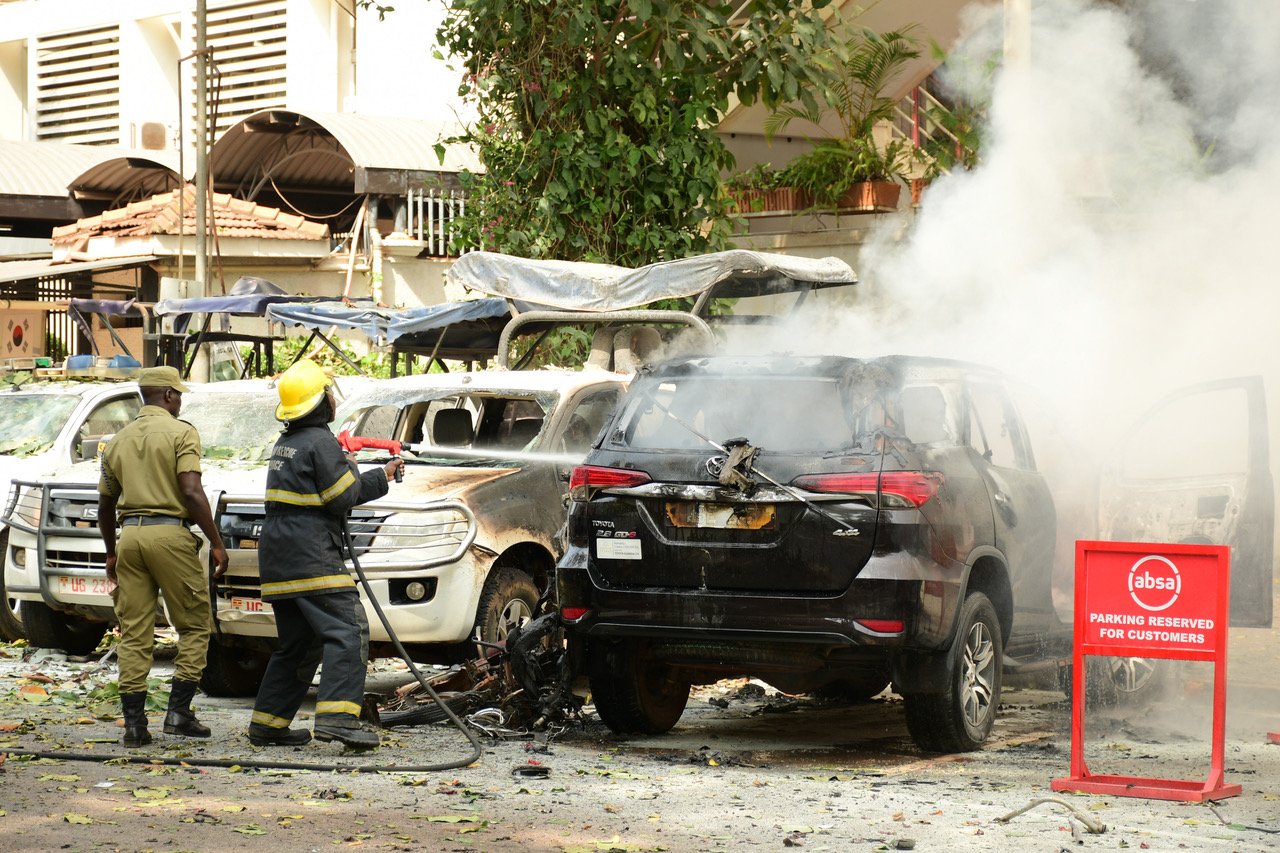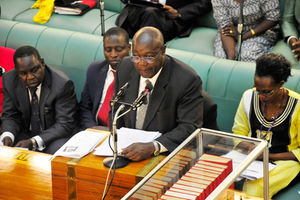
Maj Gen Geoffrey Katsigazi Tumusiime while still deputy IGP. Photo/File
The recent demonstrations in the country elicited a range of reactions, with President Museveni, who framed the anti-corruption crusade as being funded by foreigners, saying they would be met with force.
“Some of the authors and participants of the demonstrations were planning bad things against the people of Uganda. Those very bad things will come out in court when those who are arrested are being tried,” Mr Museveni said, adding a caveat that it’s possible that some participants didn’t know any of the alleged planned foreign funding and planned bad things.
Days after Mr Museveni’s claim, the Director of Public Prosecutions (DPP) charged Forum for Democratic Charge (FDC) activists with terrorism. The decision was met with a mixture of surprise and anger from critics, who contend that the charge of terrorism is being weaponised.
It all started when a group of 36 activists from the FDC faction based on Katonga Road in Kampala were controversially deported from Kisumu, Kenya, where they said they had gone to attend a workshop. The 36 activists were charged in the Nakawa Magistrate’s Court, with DPP Jane Frances Abodo, claiming they had gone to Uganda’s eastern neighbour, which is in the grip of anti-government demonstrations led by the youth, with the “intention of providing or receiving terrorist training.”
The charge of terrorism, which according to Ugandan laws carries a maximum penalty of death, has been deemed as a political charge. This is a message that the activists communicated when upon being read the charges, burst into an anti-regime song: “Deep in my heart, I do believe Museveni will go someday.”
Roots of the offence
Unlike the Penal Code that Uganda inherited from its colonialist master, Britain, the anti-terrorism legislation doesn’t have a long history. Adopted in 2002 in the aftermath of the September 11, 2001, terrorist attacks on the United States of America, the intention of the Act, at least in theory, is to suppress acts of terrorism.
It also provides for the punishment of persons who plan, instigate, support, finance or execute acts of terrorism; prescribes terrorist organisations; and provides for the punishment of persons who are members of, or who profess in public to be members of, or who convene or associate with or facilitate the activities of an organisation designated as terrorist organisations.
The Act, furthermore, provides for the investigation of acts of terrorism and the surveillance of persons suspected to be planning or involved in acts of terrorism.
Although the Act’s publicised intentions are to fight terrorism, in 2004 Justice Solomy Balungi Bossa, now a judge at the International Criminal Court (ICC), presented a paper to the International Commission of Jurists (ICJ). Justice Bossa warned that nothing in the recent past has posed a greater challenge to human rights than the war on terrorism. In the paper that she co-authored with Titus Mulindwa, the judge also warned that, thanks to the Anti-terrorism Act, governments of all political stripes are now freer to pursue more muscular policies towards their dissenters.
“Anti-Terrorism legislation across the world threatens to undermine democracy. Anti-terrorism legislation can easily be used to suppress or undermine democratic opposition and human rights. At best, even if not put to immediate use against civil society, such laws are likely to be a sword of Damocles dangling over the neck of anyone overly keen on exercising democratic rights even in the most peaceful and law-abiding way possible,” Justices Bossa and Mulindwa said, further stating that it may be argued that, rather than enact anti-terrorism legislation, the legislature should focus on defining the activity that constitutes a crime.
Also adding that no new laws may be necessary because virtually, all evident activity commonly associated with terrorism is already a crime.
Defining terrorism
The rationale for the Act notwithstanding, Justices Bossa and Mulindwa pointed out several other controversial issues that continue to stick out like the proverbial sore thumb. The duo, for one, pointed out that the definition of terrorism is problematic because it covers a wide range of activities and overlaps significantly with other existing common law or statutory crimes.
“The only difference seems to be the motivation for the action. For instance, causing injury or damage to someone is an offence under the criminal law, but causing injury or damage to someone with the intention of compelling the government to do or refrain from doing something is a terrorist act,” Justices Bossa and Mulindwa reasoned, adding that such a broad definition runs contrary to the principle of legality.
“A basic tenet of the principle of legality is that legislation should not be vague and should define, with reasonable precision, the ambit of prohibited conduct,” the duo further averred.
They said the definition of terrorism around which the legislation is constructed is problematic because it is so broad that it could be used to prosecute trade unionists involved in an illegal strike or those engaged in civil disobedience.
“This is so because the definition does not specifically exclude legal strikes and protests that do not aim to seriously disrupt an essential service,” the authors noted.

Dr Kizza Besigye, Opposition leader. Photo/File
The warning came to pass in 2005 when Opposition leader Dr Kizza Besigye was charged in the General Court Martial with terrorism and illegal possession of firearms. Dr Besigye, who had returned from exile to mount yet another challenge against President Museveni’s decades’ hold onto power, had already been charged with treason and rape. Instead of spending time on the campaign trail engaging voters, Dr Besigye was always in and out of courtrooms and later the charges were dropped as they had served the purpose.
Sinister motives?
“The intention of charges such as terrorism is not to find you guilty, but it’s stop you from engaging with voters as you are ever going to court to report,” Ibrahim Ssemujju, the Kira County lawmaker, told Monitor.
Dr Besigye, who first raised the red flag about the FDC activists recently arrested in Kenya, echoed Mr Ssemujju’s sentiments about the State’s tactics of holding people on lengthy warrants. “The only purpose of this (capital) charge is to make it difficult for the accused to apply for bail so that they’re locked away for months. The charge is just an extension of the physical torture they’ve endured so far,” Dr Besigye said, adding, “I have, previously, been charged with the same offence of terrorism in military and civil court simultaneously. I’ve been charged with treason twice; rape once; illegal possession of guns; and countless times with incitement to violence, illegal assembly etc- all without any iota of evidence! Total abuse of the judicial system.”
Yet Justices Bossa and Mulindwa had warned the wide scope of the Anti-Terrorism Act had the potential to damage freedom of expression and freedom of assembly. This is because, they further offered, it subjects political activities to criminal sanctions, even when there has been no criminal activity.
‘Guilt by association’
“It could be argued also that this particular section of the law imposes guilt by association, rather based on one’s acts. The Act makes it a crime, for instance, to send blankets to a refugee relief centre, not because doing so is wrong, but because the law has designated the ‘organisation’ or ‘association’ or ‘combination of persons’ who run the centre as terrorists. This is guilt by association.”
The use of the anti-terrorism legislation to curtail freedom of association and assembly was observed when police punctuated Opposition National Unity Platform (NUP) leader Robert Kyagulanyi, alias Bobi Wine’s rallies with the issuing of terror warnings.
“We are sending this strong message that our country, Uganda, will not wait for its villages, towns, urban centres and cities to burn, before taking action to protect its citizens and property. We are going to put an end to the mob mentality, bullying and intimidation tactics of NUP radicals, against innocent civilians and law enforcers,” Maj Gen Geoffrey Katsigazi Tumusiime wrote last year when he was the Deputy Inspector General of Police.
August 1 statement of Kisumu County Governor
“My attention has been drawn to an unfortunate incident where 36 Ugandan politicians from the Forum for Democratic Change (FDC) party were attacked and violently arrested from a guest house in Kisumu last week.
According to Ugandan Opposition leader, Dr Kiiza (sic) Besigye, the FDC politicians had just concluded a meeting at the Ukweli Pastoral Centre on the outskirts of Kisumu City on 23 July 2024, when a group of armed people believed to be Ugandan and Kenyan security personnel broke into their rooms, assaulted, arrested and drove them back to Uganda in the middle of the night.
I am further informed that the politician had been lawfully allowed to enter Kenya by immigration officials to attend the meeting.
Although the County Government of Kisumu has no link with the politicians, we condemn in the strongest terms possible the Human Rights Violations meted against them while within the territory of Kisumu County.
As the governor of Kisumu where the incident happened, I challenge the Kenyan Police to clarify if its officers were involved in the attack and hurried deportation of the Ugandans and the reason behind the incident.
I further call for detailed investigations into this matter. Ugandan authorities should also tell the world the nature of crimes committed by the 36 politicians. Kenya is a democratic country that obeys international human rights charters and should not be used to curtail the rights of other people legally in our country.”
H.E. PROF. ANYANG’ NYONG’O, EGH









